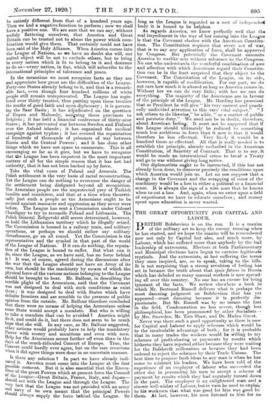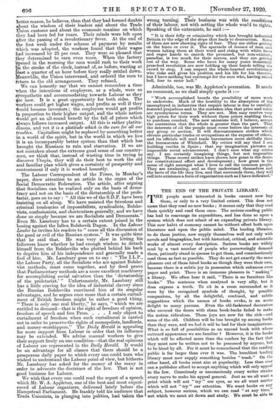THE GREAT OPPORTUNITY FOR CAPITAL AND LABOUR.
BRITISH Bolshevism is on the run. It is a maxim -UP of the military art to keep the enemy running when he has started, and we hope the maxim will be remembered now not only by Capital but also, and much more, by Labour, which has suffered more than anybody by the bad leadership of extremists. Electors at both Parliamentary and Municipal elections have begun to exercise legitimate reprisals. And the extremists, at last suffering the terror they once inspired, are, so to speak, taking to the hills. It is not surprising that a strong revulsion of feeling has set in because the truth about that ignis fatness in Russia which has deluded so many manual workers is now spread- ing all over this country. No one has an excuse for being ignorant of the facts. We review elsewhere a book in which Mr. Bertrand Russell delivers what is perhaps the most damning judgment on Bolshevism that has yet appeared—most damning because it is perfectly dis- passionate. But Mr. Russell was by no means the first in the field. Condemnation no less severe, though less philosophical, has been pronounced by other Socialists— by Mrs. Snowden, Mr. Tom Shaw, and Dr. Haden Guest. Never was there such a good opportunity as there is now for Capital and Labour to apply schemes which would be to the incalculable advantage of both ; for it is probable that in many trades the workers would be willing to try schemes of profit-sharing or payments by results which hitherto they have rejected either because they were waiting for the Bolshevik millennium or because they had been ordered to reject the schemes by their Trade Unions. The best time to propose fresh ideas to any man is when he has COMe to mistrust his leaders. We have been told of the experience of an employer of labour who succeeded the other day in persuading his men to accept a scheme of payment by results which they had regularly turned down in the past. The employer is an enlightened man and a sincere well-wisher of Labour, but in vain he used to explaic to his workmen that what was good for him was good to; them. At last, however, his men listened to him for no better reason, he believes, than that they had fornied doubis' about the wisdom of their leaders and about the Trade rnion customs and about the economic maxims on which they had been fed for years. Their minds were left open 6fter the passing of a revolutionary fever. At the end of the first week under the scheme of payment by results *hich was adopted, the workers found that their wages had increased by 25 per cent. They were so pleased that they determined to earn even more. When the factory 4ened in the morning the men would rush to their work the stroke of the clock, instead of, as before, wasting at that a quarter of an hour before they really 'settled down. litteanwhile, the Union intervened, and ordered the men to return to the old arrangement. They refused, We can honestly say that we cannot remember a time • 'when the intentions of employers, as a whole, were so iympathetic and accommodating towards Labour as they 4re now. It is a great opportunity for both sides. The Workers could get higher wages, and profits as well if they *ould become investors ; the employers would get profits in proportion to their higher output, and the whole nation *mild get an all-round benefit by the fall of prices which always follows increased output. All this is rather platitu- clinous, and yet it is a platitude which is the cure for all our troubles. Capitalism might be replaced by something better • in a world of the spirit, but in the world in which we live it is an incomparably better system than that which has brought the Russians to ruin and starvation. If we are not mistaken about the extreme good sense of our country- ' men, we think that, instead of wasting time in trying to discover Utopia, they will do their best to work the old and familiar plan which gives a certainty of prosperity and contentment if only it is worked honestly.
The Labour Correspondent of the Times, in Monday's paper, drew attention to an article in the organ of the Social Democratic Federation. The article, after arguing that Socialism can be realized only on the basis of demo- Oacy and not on the basis of the dictatorship of the prole- tariat, goes on to say : "All this we of the S.D.F. have been insisting on all along. We have resisted the frivolous and .criminal tendencies of imposaibilists, syndicalists, Bolshe- ts, confusionists, and shortcutters generally, and we have done so simply because we are Socialists and Democrats." Even Mr. Lansbury has to a certain extent joined in the booing against the fallen Bolshevik Dagon. In the Labour Leader he invites his readers to" cease all this discussion of the good or evil of the Russian system." It was quite time that he said that. He was very slow in letting his followers know whether he had enough wisdom to detach himself from the Bolsheviks who plotted behind, his back to deprive him of his independence and generally made a fool of him. Mr. Lansbury goes on to say : "The I.L.P., the Labour Party, all the Socialists who are against Bolshe- vist methods, must come together, and by deed prove that Parliamentary methods are a more excellent machinery for accomplishing social salvation than the 'dictatorship of the proletariat.'" Unfortunately, Mr. Lansbury still has a little craving for the idea of industrial slavery since the Russian Bolsheviks convinced him of its singular advantages, and he argues once more that a certain curtail- ment of British freedom might be rather a good thing. "There is only one real liberty," he says, "which we are entitled to demand—that is the right of freedom of opinion, freedom of speech and free Press. . . . I only object to curtailment of freedom when such curtailment is carried out in order to preserve the rights of monopolists, landlords, and money-worshippers." The Daily Herald is appealing for more support from Labour in order that its influence may be extended. We advise manual workers to give their support freely on one condition—that the real opinions of Labour are represented in the Daily Herald. It would be an advantage for all classes that there should be a prosperous daily paper to which every one could turn who' wished to understand the Labour point of view, but hitherto Mr. Lansbury has asked for the money of the many in order to advocate the doctrines of the few. That is not good business for Labour.
We wish that every one could read the report of a speech which Mr. W. A. Appleton, one of the best and most experi- enced of Labour organizers, delivered lately before the Hampstead Parliament. He frankly told his audience that Trade Unionists, in plunging into politics, had taken the wrong turning. Their business was with the .conditions of their labour, not with setting the whole woili to rights. Speaking of the extremists, he said :- "It is their folly or criminality which has brought industrial Britain to the edge" of the slope that leads to destruction. Some of them are now showing signs of fear. They are either getting on the fence or over it. The spectacle of masses of Men and women taking them at their word and rising with white faces and eager hands to snatch the promised, but non-eitistent, paradise, is too much for their nerves, and they are getting out of the way. Some who have for many years insistently preached revolution are now holding up their hands telling the crowd to stop. I can respect the whole-hearted revolutionary who risks and gives his position and his life for his theories, but I have nothing but contempt for the men who, having raised hell, fear to enter hell."
Admirable, too, was Mr. Appleton's peroration. It needs no comment, so we shall simply quote it :7-- " Work accomplished breeds the possibility of more work to undertake. Much of the hostility to the absorption of the unemployed in industries that require labour is due to carefully fostered prejudices and to the mistaken idea that price and value are synonymous terms. They are not. Men may receive very high prices for their work without these prices enabling them to purchase comfort. The new unionists will, I believe accept the contention that the whole is greater than the part. That the interests of all the people must come before the interests of any group or section. It will discountenance strikes which elevate particular trades or occupations at the expense of others, and its officials will read trade barometers more skilfully than the bureaucrats of Whitehall. My critics will say that I am building castles in Spain ; that my imagination pictures an impossible social advancement. I don't care what my critics say. I am certainly imagining things, but not impossible things. These recent strikes have shown how great is the desire for constitutional effort and development; how great is the eense of right amongst what I love to call the common people. They are awakening, and as they understand themselves and the facts of the life they live, and that surrounds them, they will call into existence a form of organization such as I have indicated."







































 Previous page
Previous page